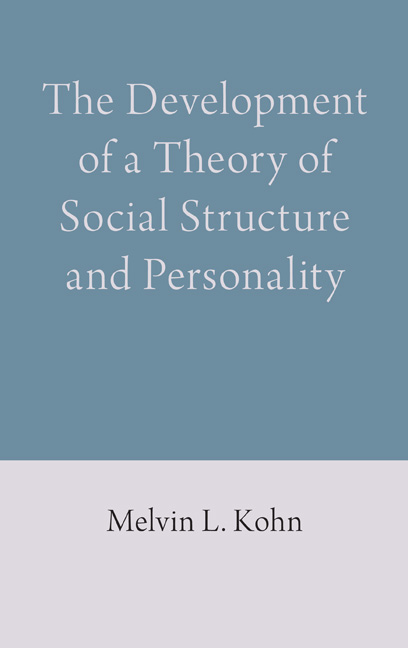Book contents
- Frontmatter
- Contents
- Preface
- 1 Hagerstown and Schizophrenia
- 2 Social Stratification and Parent–Child Relations in Washington, DC
- 3 The Torino Study
- 4 Men Employed in Civilian Occupations in the United States
- 5 The Transformation of the Occupations Study into a Longitudinal Analysis
- 6 Life on Sabbatical Leave in Norway and at the National Institute of Mental Health
- 7 Class, Stratification, and Personality
- 8 Poland under Communism
- 9 Occupational Self-Direction and Distress in Poland
- 10 The Vietnam War, Nixon, and Me
- 11 Japan
- 12 Germany – West and East
- 13 Poland and Ukraine in Transition to Capitalism and Democracy
- 14 The Presidency of the American Sociological Association, Ronald Reagan, and My Job Switch
- 15 My Two Exploratory Expeditions to China
- 16 China in Transition to a Modern Economy
- 17 Retirement, and My Last Sabbatical, at Deep Springs Junior College
- 18 The Theory I Propose
- Index
13 - Poland and Ukraine in Transition to Capitalism and Democracy
Published online by Cambridge University Press: 12 July 2019
- Frontmatter
- Contents
- Preface
- 1 Hagerstown and Schizophrenia
- 2 Social Stratification and Parent–Child Relations in Washington, DC
- 3 The Torino Study
- 4 Men Employed in Civilian Occupations in the United States
- 5 The Transformation of the Occupations Study into a Longitudinal Analysis
- 6 Life on Sabbatical Leave in Norway and at the National Institute of Mental Health
- 7 Class, Stratification, and Personality
- 8 Poland under Communism
- 9 Occupational Self-Direction and Distress in Poland
- 10 The Vietnam War, Nixon, and Me
- 11 Japan
- 12 Germany – West and East
- 13 Poland and Ukraine in Transition to Capitalism and Democracy
- 14 The Presidency of the American Sociological Association, Ronald Reagan, and My Job Switch
- 15 My Two Exploratory Expeditions to China
- 16 China in Transition to a Modern Economy
- 17 Retirement, and My Last Sabbatical, at Deep Springs Junior College
- 18 The Theory I Propose
- Index
Summary
To return to my story of the Polish research, there was now really exciting news. We had been able to enlist the cooperation of our Ukrainian colleagues, Valeriy Khmelko and Vladimir Paniotto, to be our collaborators in a comparative study of the transition of Poland and Ukraine to capitalism and democracy.
I had long been interested in doing a study of the Soviet Union. I had even secured for myself the position of the US representative on the governing board of the International Research and Exchanges Board (IREX), to negotiate on behalf of the United States with the representatives of the Soviet Union on matters sociological. All dealings with the Soviets then required a top-down bureaucratic arrangement. It had been great fun. I got to meet many Soviet officials, some of them splendid people, others anything but, and not to be trusted. In the course of my dealings with my Soviet counterparts, I tried to enlist the research collaboration of a noted Soviet sociologist, Vladimir Yadov, who previously had done excellent research, but he demurred. Yes, he was a member of the Communist Party. Yes, he was interested in joining me in a research project. But no, he would not be entrusted by the Soviet government with doing research on such delicate matters as the relationship of social structure and personality. He was entrusted, though, to be the Soviet codirector, with me as the American codirector, of a series of conferences of Soviet and US sociologists.
There was an old adage in Soviet life, that the further away you were located from Moscow, the more freedom you had to do research. Yadov knew two Ukrainian sociologists whom he thought top notch, and whom he thought would be interested in my project – Valeriy Khmelko and Vladimir Paniotto. He invited them to attend the next conference that we then were planning, and they of course readily agreed. (It was purely coincidental that my mother was born in Ukraine, and that I was personally interested in visiting that country.) My Polish collaborators were also intrigued with the possibility of our collaborating with Ukrainians. They knew a lot about research in nextdoor Ukraine, but the ties between the two countries were not strong, and my collaborators were immensely curious.
- Type
- Chapter
- Information
- Publisher: Anthem PressPrint publication year: 2019



